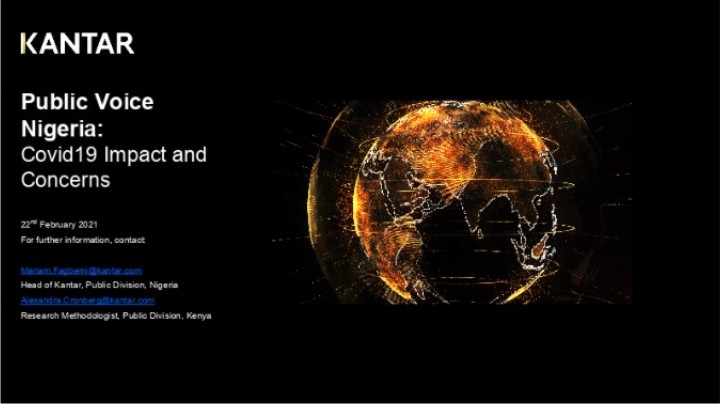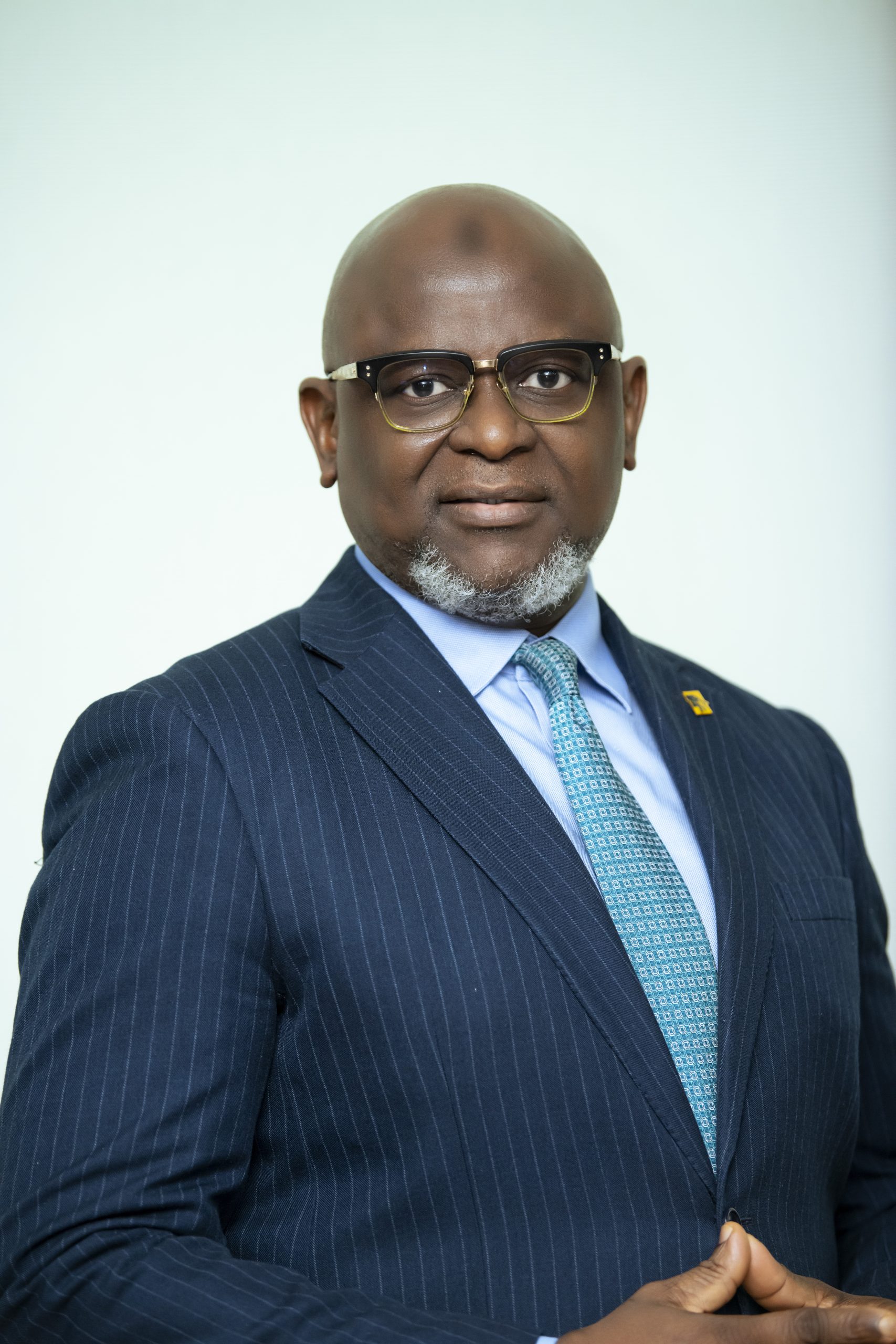Kantar Public, the public policy consulting division of the world’s leading data and insights company today publish findings from a new study that captured perceptions about COVID-19 and vaccinations. The findings show adults in Nigeria are more concerned about the COVID-19 disease than any potential effects of a COVID-19 vaccine whose full effects are not yet known.
Key findings from the study from 11-21 December 2020 in Nigeria include:
• Most adults (84%) believes COVID-19 is a serious problem, with 62% saying they are very concerned about the virus.
• Forty-two percent say they would have a high level of trust in the new COVID-19vaccines, if a vaccine were to be available to them now. This proportion is slightly lower than the share of adults who believe vaccines in general are safe (45%) and effective (47%).
• People tend to be more concerned about the negative impact of COVID-19than a vaccine whose full effects are yet unknown (54% report that they are more concerned about COVID-19). Women are generally more concerned about the risks of COVID-19 than the potential negative effects of a vaccine compared to men.
• While over two-thirds believe the government is doing enough to tackle the pandemic, less than half (47%) trust the government to make the right decision about COVID-19 vaccinations.
• Respondents’ in Nigeria most trusted source of information on COVID-19 is their family doctor (44%).
Public view of vaccinations
• Women are generally more concerned about COVID-19 than the potential effects of a vaccine compared to men (59% of women report more concern for COVID-19 vs 49% of men).
• Fifty-nine percent of adultsstatedthey would be very likely to get the COVID-19vaccination, if available free of charge. Two-thirds (66%) believe that most adults will want toget thevaccine when available.
• Almost one quarter (23%) think they are very likely to catchCOVID-19 if they are not vaccinated and 67% say a COVID-19 vaccine would be very important for their health.
• Older people are generally more worried about catching COVID-19 than any perceived risks related to receiving a vaccinethan their younger counterparts (18-34: 53%, 35-54: 55% vs 55+: 60%).
• Those who have higher levels of education tend to be more worried about catching COVID-19 than the unknown effects of thevaccine compared to less educated people (none/primary: 51%, secondary: 54% vs more than secondary: 59%).
• Just short of half (47%) trust the government to make the right decision about COVID-19 vaccinations. There is no notable difference by gender, nor age group. Better educated people tend to have less trust in the governments decision-making around the vaccine compared to less educated people (none/primary: 53%, secondary: 48% vs more than secondary: 40%).
The findings on vaccinations are similar to findings from surveys in Great Britain, Germany and Italy, where citizens are also more worried about catching and spreading COVID-19 than receiving a COVID-19 vaccine, and in contrast to findings from surveys in the USA, France, Australia and Singapore, where citizens are undecided or more worried about receiving the COVID-19 vaccine than catching and spreading the disease. (See: https://www.kantar.com/inspiration/coronavirus/infographic-public-opinion-about-covid-19-vaccination)
COVID-19 information sources and trust in government
• Respondents’ in Nigeria most trusted source of information on COVID-19 is their family doctor (44%), followed by traditional media (28%), health authorities (26%) and social media (25%). Men are more likely than women totrust social media (30% vs 21% respectively).
• Older people tend to have more trust in traditional media (newspaper, TV, radio), compared to younger people (18-34: 23% trust traditional media vs 35-54: 33% and 55+: 40%). This may be symptomatic of their media behaviour and access to other sources of digital/online media.
• People with higher education are more likely to say they trust social media compared to less educated people, perhaps due to greater exposure and a broader social media footprint (domestic/international) (none/primary: 10% trust social media vs secondary: 29% and more than secondary: 37%).
Lisa Menning, who leads the Demand and Behavioural Sciences Team of the World Health Organization’s Department of Immunization, Vaccines and Biologicals, said of the research conducted using the Kantar Public Voice panel that, “Being able to get a rapid and representative picture of public perceptions and concerns about the Covid-19 vaccination is critical for pandemic planning and response among local and global public health officials and policy makers alike.”
Kantar’s Public Voice panel in Nigeria provides a quick and affordable way of collecting high-quality representative data on social, economic, political and development issues across the country. Respondents are randomly selected from a pool of 12,000 adults who took part in an earlier face-to-face survey representative of all six geo-political zones of Nigeria. The data are weighted to reflect the national population by gender, age, education, and geo-political zone.
Public Voice surveys provide cost-effective alternatives to classic face-to-face methods, while maintaining high data quality standards. Public Voice allows clients to continue to measure the impact and effectiveness of their programmes, while also capturing valuable data that will help them with COVID-19response and recovery efforts, now and in the weeks and months ahead. If you are interested in adding questions to our surveys, please reach out to Kantar Public’s office in Lagos ([email protected]).
Methodological information
Please contact us for further details on the methodological approach or if you are interested in acquiring any of the data.
A total of 902interviews were conducted over the telephone between 11th and 21st December2020among adults (18+) living inNigeria. Interviews were conducted using Kantar’s nationally representative, probabilistic panel, Public Voice, as the sample source.
The data was weighted to ensure national representativeness. The weights adjust for non-response across sub-groups in the population (gender, age, education, and geo-political zone).
Any use of this research must cite Kantar Public as the source.
About Kantar Public
Kantar is the world’s leading evidence-based insights and consulting company. We have a complete, unique and rounded understanding of how people think, feel and act; globally and locally in over 90 markets. By combining the deep expertise of our people, our data resources and benchmarks, our innovative analytics and technology, we help our clients understand people and inspire growth.
Kantar’s experts provide the evidence needed for successful decision-making in government and the public sector. They have expertise in public policy formulation and evaluation, public opinion and voting intention studies, national statistics and longitudinal studies, plus consulting and advisory services in behaviour change, public communications and policy design.






Comment
No comments found.